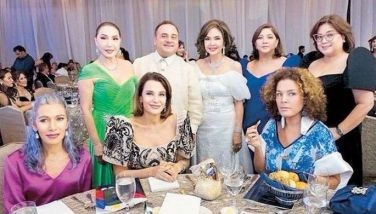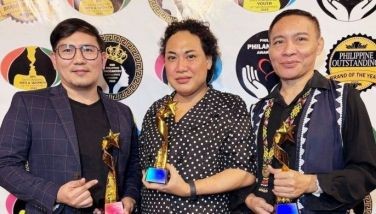Azkals: Pure determination
MANILA, Philippines - The Azkals are hoping to book a place in the AFC Challenge Cup finals next year with a stellar showing in the qualifying round, ongoing until Tuesday at the Rizal Memorial Football Stadium. Manager Dan Palami is counting on his team to reach new heights, especially before the home crowd. “We are playing in our home ground, our players need this hometown boost,†he said at a press conference recently.
Since their 2010 surprise win over defending champion Vietnam to get to the semifinals of the AFF Suzuki Cup, the Philippine National Football Team – aka the Azkals – has spurred a renewed interest in football in this basketball crazy country.
Palami took over management of the Azkals in 2010. “In the beginning our goal was to simply keep the scores close,†he shares. “But after the Suzuki Cup, we had a reputation to protect. It’s not enough to keep the scores decent; we had to win games. We needed to develop the team into a stronger unit, because we were going to another competition, the AFC Challenge Cup.â€
A stronger unit meant inviting Filipinos playing in professional leagues abroad to join. “It helps that the world has gotten smaller,†he says, referring to social networking sites that aided in connecting with the players through relatives and friends. They also looked into the leagues in Europe for players of Filipino heritage. And happily, they found many players of Filipino descent to complement the hometown boys. Aside from the now superstars Phil and James Younghusband, there were Dennis Cagara, Jerry Lucena, brothers Juan and Angel Guirado, and twins Marwin and Marvin Angeles.
Born and raised in Denmark, Dennis played for the Denmark national under-21 football team. In 2011 he met Hans Michael Weiss (now Azkals head coach) and Palami, who, like him, is from Leyte. “I’m really happy I joined,†Dennis says. “No regrets.â€
Sharing a similar story with Dennis is Jerry, who also played in the Denmark national under-21 team.
“Playing football for such a long time, I was already thinking about quitting after playing in Denmark,†says Jerry. “Now I don’t want to stop. It makes me happy. It brought back my passion for football, and to give people happiness is priceless.â€
Brothers Juan and Angel played together in Spain. Angel became part of the Azkals in 2011, Juan a year later, because he had a job.
“The experience is very wonderful when you see the response to the team. A lot of people watch,†says Juan.
Angel says: “I’m very happy to be part of this – of history.â€
Two of the youngest members of the team are twins Marwin and Marvin, who learned about the Azkals through a family friend. Without any expectations of getting in, both auditioned and, to their surprise, pulled through.
There is still a lot of football to play for these brothers, but for now they are taking it one game at a time. “We try our best every game,†they say.
The first thing that these “imports†ask is what an Azkal is. For the uninitiate, Azkal isa stylized version of askal, from the words aso (dog) and kalye (street). The name has stuck, because just like street dogs, the Azkals are scrappy, relentless, and are survivors.
Jerry shares that he thought they were called Azkals because they are of mixed blood. It is an attribute that Palami acknowledges, even celebrates: “I think that’s what makes a street dog survive. He’s able to adapt to the environment. The players are coming from Denmark, Germany, and Spain; but we managed to make a team. Of course the common denominator is the Filipino blood in them, and you can see that in the way they bring everything out into the game.â€
With success comes criticism, but Palami says, “You just have to filter them. Of course you have to take criticism, that’s how you improve. But after you absorb it, you just go on.â€
He admits that what truly hurts is when fellow Filipinos call the players non-Pinoys. “Why is it that we call the OFWs our new heroes, yet we don’t want to recognize their offspring as Filipinos?†he says. “I’ve been with them for two years and I know how they feel, how proud they are to be Filipinos.â€
If they make it through in the ongoing AFC Challenge Cup where they are grouped with Brunei, Cambodia and Turkmenistan, they go into the finals next year in the Maldives, and from there, possibly playing in the AFC Asian Cup in 2015. Everyone agrees that would be the highlight of their football career.
Juan is positive about achieving their dreams. “Before it seems impossible, but we’ve done more than what people thought we could do,†he says.
Palami adds, “Three years ago, to even think about getting to play against powerhouse countries in Asia like Bahrain and Kuwait was absurd. But now it’s a reality.â€
“The extraordinary thing about all this is not just the fact that we were able to achieve success, but that success has been achieved in such a short time. We turned the team around in two years,†he continues, adding that everyone’s dedication made it happen.
“If you compare us to the other countries like Vietnam, Singapore, and Thailand, they all have a premier league that’s been together for a long time,†adds Dennis.
The Azkals, driven by their passion for the sport and inspired by a legion of faithful followers, look forward to bigger things. For Palami, the road towards victory is not always a smooth one. There are the expenses and the long hours spent with the team, sometimes at the expense of family time. But it’s all worth it: “When your bank statement arrives at the end of the month, it makes you think twice. But then, when you go out on the pitch and see how much happiness and pride you are able to bring to the Filipinos – especially when we are outside the country – then it somehow makes everything worth it and all my doubts disappear.â€
- Latest
- Trending


















